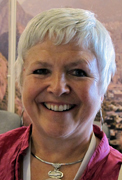Policy Bite: Family doctors – what does the name really mean?

español
Prof Amanda Howe, President-elect, writes:
This has been a special month for some. From a personal perspective, the huge news is that I have had seen the birth of my first grandchild, and our friend and colleague Dr Luisa Pettigrew (member at large on WONCA Executive) has had her second child. This has caused me to reflect on the word and meaning of ‘family’ –‘ those to whom we are bound by blood(1)‘, rather than faith, race, community, or common interests.
But family doctors are clearly not defined as being doctors to our family members – in fact, in UK this is specifically discouraged, because of factors such as emotional over-involvement, and breaking of boundaries such as discussion of personal risk factors(2). So what does the deep commitment to “family” mean in our title? As I sat in the late nights in a hospital ward following the birth, I thought of –
Witness – we watch the lives of others, try to help, give comfort, and advise: but not control
Watching and waiting – however hard we work, many things are uncertain in life’s fluctuations of health and illness; hope and despair; birth and death. Unlike many medical disciplines, we recognise the inevitability of some bad outcomes, we know that biology can play tricks; and we strive to avoid intervention and excessive heroism. We watch symptoms shift, hurts heal, and use time to reveal diagnoses and appropriate treatments.
Wonder – because in a strong health system, every night and day, for every patient, in all their ups and downs, a family doctor says hello, and treats us like family. They give consistent high quality care to us all (small /big, white/black, ill/well, old/young, tall/short) and some of them laugh and hug, and we experience each other as partners in a difficult world.
It is a huge challenge, of course , to deal with the traumas and difficulties of embracing humanity – one can only do it for so long. We must also sleep, switch off, hand over, and lean on others. Parents need support, recognition, and renewal. So do family doctors – but sometimes it comes through the act of nurturing. And so I now know again that this is what is great about health professionals, especially in family medicine. We are involved in life events and transitions – lives are lived through us, and we get involved with the lives of our patients and communities. I was very moved to hear that when Michael gave my apologies for the African regional meeting in Ghana, they applauded my reasons for staying home (“President Elect is grounded by imminent grandchild”).
So let us strive to do our best for our patients - as if they are our own.
1.
source accessed here
2.
www.gmc-uk.org/guidance/10247.asp